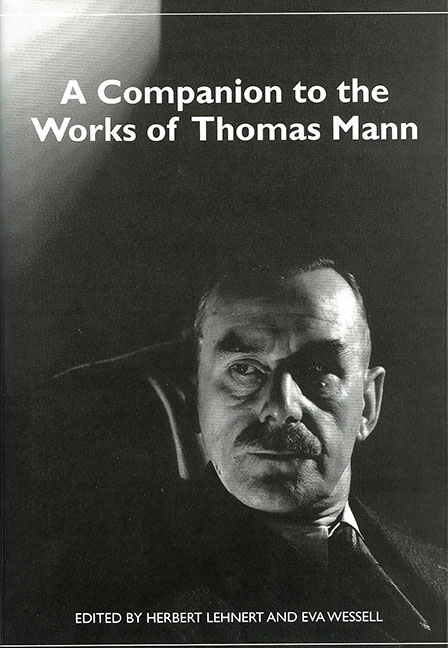Book contents
- Frontmatter
- Contents
- Foreword
- Thomas Mann's Works
- List of Abbreviations
- Introduction
- Thomas Mann's Beginnings and Buddenbrooks
- Art and Society in Thomas Mann's Early Novellas
- Love in Society: Thomas Mann's Early Stories
- “Death in Venice”
- “Mein ‘Friedrich’ — das ist was Anderes”: Thomas Mann's Unwritten Novel about Frederick the Great, King of Prussia
- Magic and Reflections: Thomas Mann's The Magic Mountain and His War Essays
- Thomas Mann's “Autobiographical” Stories
- Joseph and His Brothers
- Lotte in Weimar
- Thomas Mann's Late Politics
- “German” Music and German Catastrophe: A Re-Reading of Doktor Faustus
- The Gaze of Love, Longing, and Desire in Thomas Mann's “The Transposed Heads” and “The Black Swan”
- Felix Krull
- Female Identities and Autobiographical Impulses in Thomas Mann's Work
- Betrayed or Not Betrayed: A Testament?
- Thomas Mann's Comedies
- Notes on the Contributors
- Select Bibliography
- Index
“Death in Venice”
Published online by Cambridge University Press: 28 April 2017
- Frontmatter
- Contents
- Foreword
- Thomas Mann's Works
- List of Abbreviations
- Introduction
- Thomas Mann's Beginnings and Buddenbrooks
- Art and Society in Thomas Mann's Early Novellas
- Love in Society: Thomas Mann's Early Stories
- “Death in Venice”
- “Mein ‘Friedrich’ — das ist was Anderes”: Thomas Mann's Unwritten Novel about Frederick the Great, King of Prussia
- Magic and Reflections: Thomas Mann's The Magic Mountain and His War Essays
- Thomas Mann's “Autobiographical” Stories
- Joseph and His Brothers
- Lotte in Weimar
- Thomas Mann's Late Politics
- “German” Music and German Catastrophe: A Re-Reading of Doktor Faustus
- The Gaze of Love, Longing, and Desire in Thomas Mann's “The Transposed Heads” and “The Black Swan”
- Felix Krull
- Female Identities and Autobiographical Impulses in Thomas Mann's Work
- Betrayed or Not Betrayed: A Testament?
- Thomas Mann's Comedies
- Notes on the Contributors
- Select Bibliography
- Index
Summary
Background
In the spring of 1911, when he was working on his story of the confidence man Felix Krull, Thomas Mann found himself in severe artistic difficulties. Not only was he so physically and mentally exhausted that he felt like checking into a sanatorium, but he was also at a critical stage in the composition. He was uncertain as to where next to take the narrative. This turned out to be only the first of several interruptions of writing a text that remained fragmentary in the end.
This crisis was just the most recent in a series of unsatisfying, frustrating, or downright failed projects. The career of the former twenty-five-year-old prodigy who had produced the best-selling hit Buddenbrooks (1901), now in his mid-thirties, seemed to be in a pronounced valley. Before the problems with “Krull,” Mann had given up on several other stories he had wanted to write; and the things he completed did not have the luster of his youthful productions. The play Fiorenza (1905) satisfied neither its author nor its intended audience, and Mann would not try his hand at drama again until the very end of his career. The novel Königliche Hoheit (Royal Highness, 1909), though a perfectly respectable success by most standards, did not attain to the same exalted status formerly achieved by — and now almost expected of — the author of Buddenbrooks.
With the “Krull” manuscript now at an impasse, it was clear that Mann needed some respite from the tension that was overwhelming him, and so he decided to take a vacation. He, together with his wife and brother Heinrich, went first to Brioni, an island on the eastern shore of the Adriatic. It was there that Mann learned of the death of Gustav Mahler, whom Mann had spoken with as recently as the occasion of the premier of Mahler's Eighth Symphony in the fall of 1910. But the Mann party decided quickly that Brioni was not a good place to remain for an entire vacation. They decided to move on to Venice, where they stayed at the Hotel des Bains on the Lido from late May to early June. While in Venice, Mann wrote a short magazine article for the Viennese publication Der Merker on the subject of Richard Wagner.
- Type
- Chapter
- Information
- A Companion to the Works of Thomas Mann , pp. 95 - 114Publisher: Boydell & BrewerPrint publication year: 2004

